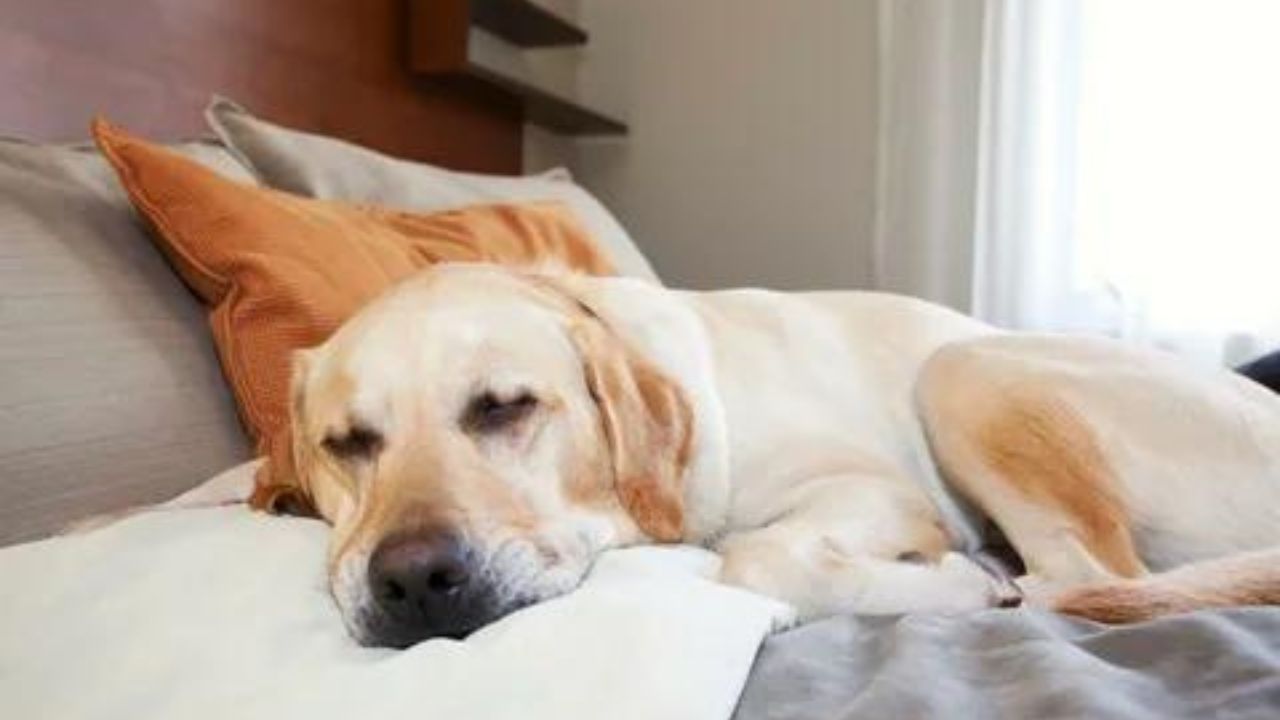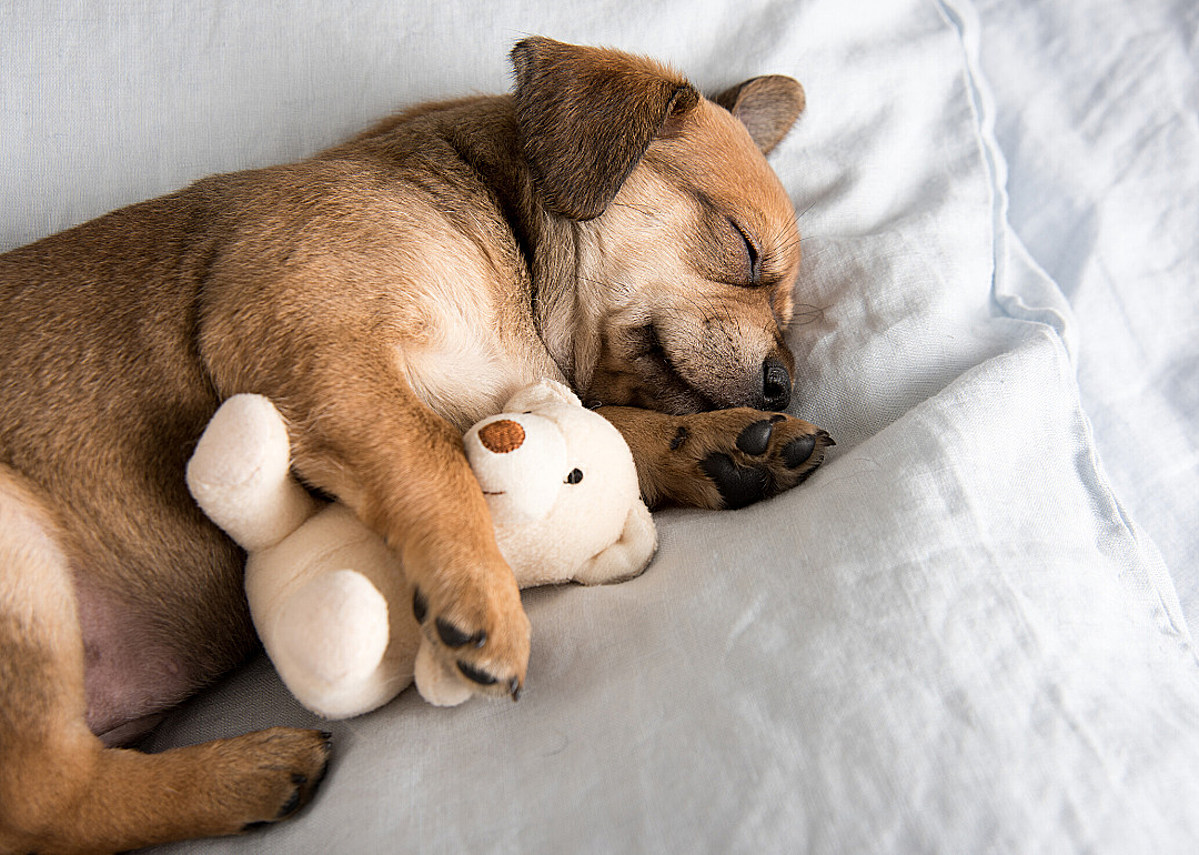
Do you ever look at your puppy and wonder, “Why are your puppies sleeping so much and not eating?” As a new puppy owner, it can be alarming when your furry friend starts exhibiting behavior outside their usual sleep routine. But don’t fret! In this article, we’ll explore why your puppy may be sleeping excessively or refusing to eat and what you can do to help.
First, let’s address the elephant in the room: puppies are notorious for sleeping. In fact, according to a study by the American Kennel Club, puppies can sleep up to 18-20 hours a day! That’s almost as much as a newborn baby. If you notice your puppy napping more often than usual, it may be a part of its natural behavior. However, there are cases where excessive sleep can be a sign of an underlying health issue or a change in their environment.
On the flip side, not eating can also concern puppy owners. Whether your pup is a picky eater or refusing food altogether, it’s important to understand the potential reasons behind their lack of appetite. From dietary changes to behavioral issues, we’ll cover the most common reasons your puppy may not be interested in their food.
So, grab a snack and dive into puppies’ sleep and appetite!
Reasons For Puppies Sleeping So Much
Puppies are known for their love of sleep, and it’s common to find them napping away for most of the day. However, there are times when excessive sleep can be a cause for concern. Here are some of the most common reasons why your puppy may be sleeping more than usual:
Age And Developmental Stages
Puppies go through various developmental stages, each requiring a different amount of sleep. For instance, newborn puppies can sleep up to 90% of the day, while 3-6 month-old puppies need around 16-18 hours of sleep daily. As they reach adulthood, the amount of sleep required decreases to around 12-14 hours a day. If your puppies sleeping more than usual, it could be a sign that they’re going through a growth spurt or developmental phase.
Health Issues
Sometimes, excessive sleep can be a sign that your puppy is unwell. Conditions such as anemia, hypothyroidism, or liver disease can cause lethargy and sleepiness in dogs. In addition, puppies who have just been vaccinated or undergone surgery may feel more tired than usual.
Changes In Environment
Puppies are creatures of habit and thrive on routine. Any changes in their environment, such as moving to a new home or being separated from their littermates, can cause anxiety and stress, leading to excessive sleep.
Boredom Or Lack Of Stimulation
Puppies need plenty of mental and physical stimulation to energize them. Without enough playtime or exercise, they may become bored and disinterested, leading to long periods of sleep.
If you’re concerned about your puppy’s sleeping patterns, it’s always a good idea to consult your veterinarian. They can rule out any underlying health issues and offer advice on ensuring your puppy gets the right amount of sleep and stimulation.
Reasons For Puppies Not Eating
A healthy appetite is a sign of good health, while a sudden lack of interest in food may indicate an underlying issue. Here are some of the most common reasons why your puppy may not be eating:
- Appetite changes during different stages of growth: Just like humans, puppies have different nutritional needs at various stages of their growth. It’s normal for a puppy’s appetite to fluctuate, especially during growth spurts. For instance, during teething, puppies may experience discomfort and pain, making it difficult for them to eat. In such cases, try offering softer or wet food to alleviate the pain.
- Common health issues that affect a puppy’s appetite: Several health issues can cause a puppy to lose its appetite. One of the most common is gastrointestinal (GI) problems. If your puppy is experiencing vomiting, diarrhea, or abdominal pain, it may not feel like eating. Other potential causes of a decreased appetite include dental problems, infections, or fever if your pup shows any of these symptoms.
- Dietary concerns and changes: Changes in a puppy’s diet can also cause them to lose interest in food. For example, they may refuse to eat if you switch their food suddenly or introduce new treats. It’s important to gradually transition to the new food, mixing it with their old food over a week or two.
- Behavioral factors that can lead to appetite loss: Stress, anxiety and changes in routine can all affect a puppy’s appetite. Your pup may not want to eat if they feel anxious or overwhelmed. Similarly, they may become too distracted to eat if a significant change in their environment, such as a move or a new pet. In such cases, try to make your pup feel comfortable and relaxed before mealtimes.
What To Do to Solve It!
If your puppy is sleeping more than usual or not eating, there are several steps you can take to help them get back to their happy, healthy selves. Here are some tips to keep in mind:
Monitor Their Behaviour
The first step in addressing changes in your puppy’s sleeping or eating habits is closely monitoring its behavior. Please track how often they sleep, how much they eat, and any other changes in their daily routine. This information can be helpful when discussing your concerns with your veterinarian.
Visit The Vet
If you’re concerned about your puppy’s sleeping or eating patterns, it’s always best to schedule a visit with your veterinarian. They can help rule out any underlying health issues affecting your puppy’s behavior. Additionally, if your puppy has yet to have a check-up recently, your vet may recommend a physical examination to ensure your puppy is in good health.
Adjust Their Environment
Changes in your puppy’s environment can also affect their sleep and appetite. Ensure your puppy has a comfortable and safe sleeping space free from distractions or loud noises. Additionally, consider adjusting their feeding schedule or location to help stimulate their appetite.
Offer A Variety Of Foods.
If your puppy refuses to eat their regular food, try offering a variety of options to see if they prefer something. You can also try mixing wet food or adding warm water to their kibble to make it more delicious. Please make sure any changes to their diet are made gradually to avoid upsetting their stomach.
Establish A Routine
Puppies thrive on routine, so establishing a consistent schedule for feeding, playtime, and rest can help improve their overall health and well-being. Stick to a schedule as closely as possible and avoid deviating too much.
Monitoring your puppy’s behavior, visiting the vet, adjusting their environment, offering a variety of foods, and establishing a routine can all help if your puppies sleeping too much or not eating. By taking these steps, you can ensure your furry friend is happy, healthy, and well-nourished.
Conclusion
Proper nutrition and exercise are essential for a healthy and happy puppy. Give your pup plenty of love, attention, and playtime to help them stay active and engaged. Paying attention to your puppy’s behavior and taking proactive steps to support their health can ensure they grow up to be happy and healthy dogs.
So, next time you wonder why your puppy is sleeping so much or not eating, remember that there may be more than meets the eye. By staying informed and taking a proactive approach to your puppy’s health, you can help them live their best life.
FAQ
Why Is My Puppy Sleeping So Much And Not Eating?
With a puppy as Young as Luna, sleeping a lot and not eating a lot can be hard to evaluate. This may be normal for her. Puppies this age do sleep a lot and don’t require a lot of food. It’s also harder in a situation like yours, where you haven’t had her for very long.
Is A Four-Month-Old Puppy’s Increased Sleepiness Normal?
Puppies develop quickly during this stage, and sleep is crucial for their growth and development. They need 15-20 hours of sleep each day. Puppies will start sleeping less as they reach the 6-month mark, but they still require 14-16 hours of sleep per day. Understanding and ensuring their sleep needs are met is an important part of responsible pet ownership.
Why Is My Puppy Not Active?
The primary reasons for lethargy in dogs include:
- Infections like parvovirus, distemper, kennel cough, and leptospirosis.
- Metabolic diseases such as heart or liver issues, diabetes, and hypoglycemia.
- Medications like newly prescribed drugs or flea/worm products.
Why Is My Puppy So Lazy?
My puppy is sleeping more than usual and being super lazy.The first thing you should inspect if you notice your dog becoming lazier is their health, laziness can often be a symptom of illness especially if your doggy used to be active then suddenly becomes less active.
Are Quiet Puppies Ok?
If you have a puppy or adult dog who is unusually or suddenly quiet, it’s important to contact your veterinarian immediately. They can help rule out potential health reasons, including infections like parvovirus, distemper, respiratory illnesses (such as Bordetella/kennel cough), or gastrointestinal illnesses. Remember, your vet is there to support you in ensuring your pet’s health and well-being.
my puppy is sleeping more than usual
why is my puppy sleeping so much








